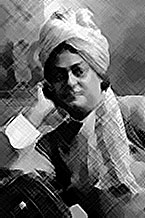Chapter 2. "Paper on Hinduism" by Swami Vivekananda

Swami Vivekananda, (detail)
About the author…
Swami Vivekananda (1863-1902), humanist and social reformer, attended Calcutta University and later studied the Vedas, Upanishads, Sufism, the Bible, Sikhism and Buddhism with Sri Ramkrishna Paramhansa. Perhaps, more than any other individual, Vivekananda is credited with introducing and explaining the universal teachings of the Vedas and Upanishads to the unacquainted Western World.
About the work…
Vivekananda's Paper on Hinduism,[1] was read at the World Parliament on Religions in 1893. Vivekananda's addresses at this congress emphasized the belief that no one religion is superior to another. In his opening address, He quoted the Gita: "As the different streams having their sources in different places all mingle their water in the sea, so, O Lord, the different paths which men take through different tendencies, various though they appear, crooked or straight, all lead to Thee." He taught that all religions are different ways of undersanding and different paths to the same goal and strongly opposed bigotry and fanaticism.
Ideas of Interest from "Paper on Hinduism"
According to Vivekananda what is the cosmology expressed in the Vedas?
What are the reasons Vivekananda offers for the belief that the universe was not created?
How does Vivekananda explain reincarnation and past lives? What is his explanation for why we cannot remember past lives?
Why does Hinduism reject the notion that we are all sinners?
According to Vivekananda, what is the main goal of Hinduism?
How does the use of mental imagery and physical representation give rise to the charge of idolatry, superstition, and bigotry in world religions?
How does Hinduism account for the major differences among the world religions?